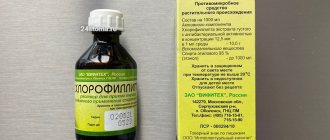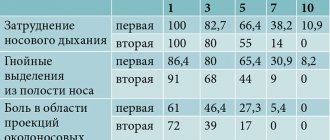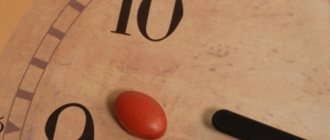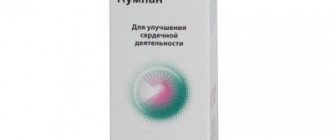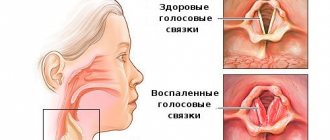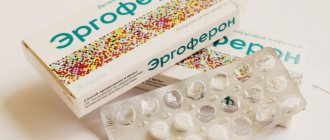Compound
| Dragee | 1 dragee |
| active substances: | |
| gentian root (Gentiana lutea) | 6 mg |
| primrose flowers (Primula veris) | 18 mg |
| sorrel grass (Rumex acetosa) | 18 mg |
| elderberry flowers (Sambucus nigra) | 18 mg |
| verbena herb (Verbena officinalis) | 18 mg |
| excipients: potato starch; colloidal silicon dioxide; purified water; lactose monohydrate; gelatin; sorbitol; stearic acid | |
| shell: calcium carbonate; glucose syrup; green varnish (E104, E132); yellow-green varnish (E104, E132); magnesium oxide; corn starch; dextrin; mountain glycol wax; sodium carbonate anhydrous; methyl methacrylate, dimethylaminoethyl methacrylate and butyl methacrylate copolymer; povidone K25; castor oil; sucrose; shellac; talc; titanium dioxide |
| Drops for oral administration | 100 g |
| active substances: | |
| hydroalcoholic extract | 29 g |
| it includes the following types of medicinal plant raw materials: | |
| gentian root (Gentiana lutea) | 0.2 g |
| primrose flowers (Primula veris) | 0.6 g |
| sorrel grass (Rumex acetosa) | 0.6 g |
| elderberry flowers (Sambucus nigra) | 0.6 g |
| verbena herb (Verbena officinalis) | 0.6 g |
| ethanol content - 16–19 vol.% | |
| excipients: purified water - 71 g |
Sinupret® drops
APPROVED Order of the Ministry of Health of Ukraine March 31, 2016 No. 288 Registration Certificate No. UA/4373/02/01
INSTRUCTIONS for medical use of the drug SINUPRET®
Composition of the medicinal product: active ingredients: 100 g of drops contain 29 g of aqueous-alcoholic extract (1:11) from gentian root (Radix Gentianae) ; primrose flowers with a calyx (Flores Рrimulae сum Сalyсіbus) ; sorrel herbs (Nerba Rumis) ; elderberry flowers (Flores Sambusi) ; verbena herbs (Herba Verbenae) (1:3:3:3:3); excipients: ethanol 19% (v/v), purified water.
Dosage form. Oral drops.
A clear or slightly cloudy liquid of yellow-brown color, bitter in taste, with an aromatic odor.
Manufacturer's name and location. Bionorica SE, Kerchensteinerstrasse 11-15, 92318 Neumarkt, Germany.
Pharmacotherapeutic group. Combined drugs that are used for coughs and colds. ATC code R05X.
The components that make up the herbal medicine have complex activity, which is manifested in secretolytic action, decongestant, anti-inflammatory, immunostimulating and antiviral effects.
The active components of Sinupret® inhibit the reproduction of various respiratory viruses, such as influenza A virus, parainfluenza and RSV (respiratory syncytial viruses).
Under the influence of the drug, secretion is regulated and tissue swelling is reduced. Drainage and ventilation of the paranasal sinuses are restored, nasal congestion is eliminated, and the protective function of the respiratory tract epithelium is normalized. The effectiveness of antibiotic therapy increases.
Indications for use. Acute and chronic inflammation of the paranasal sinuses.
Contraindications. Increased individual sensitivity to any of the active or auxiliary substances of the drug, as well as increased sensitivity to other types of primrose.
Safety precautions for use. This medicinal product contains ethanol 19.0% (v/v). During storage of the drug, turbidity or precipitation may occur, but this does not affect the effect of the drug. Shake before use.
If symptoms of the disease do not disappear after 7-14 days or recur periodically, you should consult a doctor.
Special instructions.
Use during pregnancy or breastfeeding. During pregnancy or breastfeeding, the drug can be used after consultation with a doctor in cases where the benefit of use outweighs the potential risk to the fetus/child.
The ability to influence the reaction speed when driving a vehicle or a robot with other mechanisms. At recommended doses, the drug does not affect the ability to drive vehicles or operate other machinery, but it should be taken into account that the drug contains ethanol.
Children. Due to insufficient experience with use, the drug should not be used in children under 2 years of age.
Method of administration and dose.
Unless the doctor prescribes otherwise, the drug is used in the following doses:
| Age | Single dose | Daily dose |
| Children aged 2 to 5 years | 15 drops each, equivalent to 0.9 ml | 45 drops (3 times 15 drops), equivalent to 2.7 ml |
| Children aged 6 to 11 years | 25 drops each, equivalent to 1.5 ml | 75 drops (3 times 25 drops), equivalent to 4.5 ml |
| Adults and children over 12 years of age | 50 drops each, equivalent to 3 ml | 150 drops (3 times 50 drops), equivalent to 9 ml |
The usual recommended course of treatment is 7-14 days. Adults take the drops, as a rule, undiluted. For children, drops should be added to juice or tea.
Overdose. At the moment, cases of intoxication are unknown. If the dose is exceeded, the manifestation of these adverse reactions may increase.
Treatment of intoxication: if signs of poisoning or overdose occur, symptomatic therapy is necessary.
Side effects. Gastrointestinal disorders (stomach pain, nausea, vomiting) are sometimes observed. Reactions of hypersensitivity of the skin (rashes, redness of the skin, itching), as well as allergic reactions (Quincke's edema, buttocks, swelling of the face) rarely occur. If any adverse reactions occur, you should stop taking the drug and consult a doctor.
Interaction with other drugs and other types of interactions. No interactions with other drugs were observed. Combination with antibiotics is possible and advisable.
Best before date. 2 years. Do not use after the expiration date stated on the package. The expiration date is determined until the last day of the month of the expiration date indicated on the package.
After the first opening of the bottle, the drug is suitable for use for 3 months.
Storage conditions. Store in original packaging at a temperature not exceeding 25 °C out of the reach of children.
Package. 100 ml of solution in a bottle, placed in a cardboard package.
Advertising of a medicine. Before use, consult your doctor and be sure to read the instructions.
Directions for use and doses
Inside.
The dragee should be swallowed whole, without chewing, with a small amount of water; drops for oral administration must first be diluted in a small amount of water.
Adults - 2 tablets or 50 drops 3 times a day; children from 2 to 6 years old - 15 drops 3 times a day; for school-age children - 25 drops or 1 tablet 3 times a day. Duration of treatment is 7–14 days.
If symptoms persist for more than 7–14 days or recur periodically, you should consult your doctor.
Analogs
Sinupret, containing a complex of medicinal herbs, is a combination drug. This combination naturally has no structural analogues on the pharmacological market. The pharmacy offers products with a similar therapeutic effect: Tonsilgon. They may have a similar effect, but it is worth remembering that any medicine has not only contraindications and dosage regimen, but also the risk of adverse reactions from the body. Be sure to visit a doctor!
Analogues of the drug Sinupret
For example, Sinupret and Sinupret Forte differ in the duration of exposure and therapeutic effect. Sinupret Forte lasts longer.
Sinupret/Cinnabsin
Cinnabsin, like Sinupret, is used for the therapeutic treatment of sinusitis and sinusitis in acute and chronic forms. But it should not be taken by children under 3 years of age. Cinnabsin is effective as an immunostimulating agent.
Sinupret/Korisalia
Corysalia is a homeopathic medicine that reduces the intensity of inflammatory reactions, reduces rhinorrhea, sneezing, swelling and hyperemia.
Corizalia is prescribed for the symptomatic treatment of rhinitis in adults and children over 2 years of age.
Sinupret/Aflubin
Aflubin is used in the treatment of acute respiratory infections and influenza. Unlike Sinupret, it has fewer contraindications and is easier to tolerate.
Sinupret/Tonsilgon
Tonsilgon is used more widely than Sinupret. So, in addition to the treatment of sinusitis, Tonsilgon is prescribed for throat diseases (tonsillitis, laryngitis, etc.). Unlike Sinupret, Tonsilgon is prescribed to children over 1 year of age. Before replacing Sinupret with an analogue, you should consult a specialist.
special instructions
The drops for oral administration contain 16–19 vol.% ethanol.
When using the bottle, keep it in an upright position.
Shake Sinupret® drops before using.
During storage of the solution, slight turbidity or slight precipitation may occur, which does not affect the effectiveness of the drug.
Instructions for patients with diabetes: the digestible carbohydrates contained in one tablet are less than 0.03 XE.
Impact on the ability to drive vehicles and operate machinery. When used in recommended doses, the drug does not affect the speed of reaction when driving vehicles and machinery.
Contraindications
Although Sinupret is a herbal drug, it has a list of contraindications, like any drug. Sinupret drops and syrup are contraindicated for:
- hypersensitivity and intolerance to the component(s) of the drug;
- epilepsy;
- liver diseases;
- brain diseases;
- alcoholism;
- pregnancy, breastfeeding;
- age up to 2 years.
Sinupret in pill form should not be used for:
- sucrase-isomaltase deficiency;
- intolerance to galactose, fructose;
- lactase deficiency;
- disturbances in the absorption of glucose-galactose.
Side effects
From the digestive system: often - nausea, flatulence, diarrhea, dry mouth, stomach pain.
On the part of the immune system: infrequently - local reactions of hypersensitivity of the skin (for example, rash, redness, itching), as well as possible systemic allergic reactions (for example, Quincke's edema, shortness of breath, swelling of the face).
From the nervous system: infrequently - dizziness.
If any adverse reactions occur, stop using the drug and consult a doctor.
Note!
Description of the drug Sinupret forte table. p/o No. 20 on this page is a simplified author’s version of the apteka911 website, created on the basis of the instructions for use.
Before purchasing or using the drug, you should consult your doctor and read the manufacturer's original instructions (attached to each package of the drug). Information about the drug is provided for informational purposes only and should not be used as a guide to self-medication. Only a doctor can decide to prescribe the drug, as well as determine the dose and methods of its use.
Non-drug treatments
Inhalations. During steam inhalation, particles of the drug are evenly distributed inside the nasal cavity, providing anti-inflammatory, moisturizing and antimicrobial effects. For this purpose, alkaline mineral waters, decoctions and infusions of medicinal plants (calendula, chamomile, sage, linden blossom, pine needles, juniper) are used.
Warming up the paranasal sinuses. This procedure can be started in the first days of a runny nose, if the child does not have an increasing fever, severe intoxication and sinusitis. A warm boiled egg, boiled millet, salt or sand heated in a frying pan can be used. Warming up helps reduce inflammation and swelling of the mucous membrane, improves nasal breathing.
Drink plenty of fluids. Frequently drinking plenty of fluids helps replenish fluid loss, prevents drying out of the nasal mucosa, and stimulates the body to fight intoxication. You can give regular and mineral water, compotes, decoctions, herbal teas, fruit drinks, and natural juices.
Up to contents
First aid
A runny nose causes discomfort to the child, disrupts sleep, and increases the risk of complications from the underlying respiratory tract, such as tonsillitis and bronchopulmonary diseases. In infants, nasal congestion makes sucking difficult. Fortunately, children's runny nose is curable; you need to start helping your child at the first symptoms of the disease.
First of all, you need to clean the nasal cavity. For infants, mucus is removed with an aspirator, after dripping a saline solution into each nostril to dilute the secretion. It is advisable for an older child to regularly rinse his nose with special means when he has a runny nose2, even if he already knows how to blow his nose.
With rhinitis, the nasal mucosa is irritated and swollen. To reduce discomfort, it is advisable to soften it with oil solutions of vitamins A and E (if the child does not have intolerance). To reduce swelling of the mucous membrane, you can apply a special ointment with essential oils to the wings of the nose.
Up to contents

